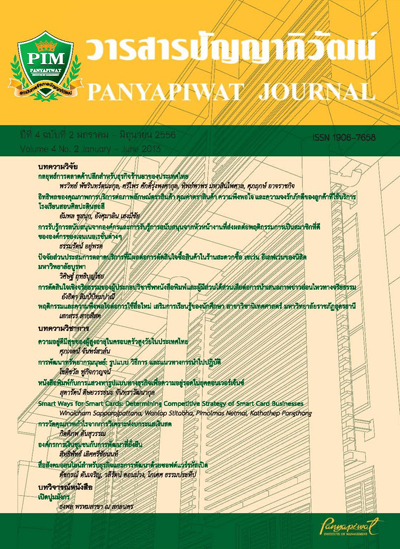การรับรู้การสนับสนุนจากองค์กรและการรับรู้การสนับสนุนจากหัวหน้างานที่ส่งผลต่อ พฤติกรรมการเป็นสมาชิกที่ดีขององค์กรของเจนเนอเรชั่นต่างๆ
Main Article Content
บทคัดย่อ
งานวิจัยนี้วัตถุประสงค์เพื่อ 1) ศึกษาความสัมพันธ์ของการรับรู้การสนับสนุนจากองค์กรของคนต่างเจนเนอเรชั่นกับพฤติกรรมการเป็นสมาชิกที่ดีขององค์กร และ 2) การรับรู้การสนับสนุนจากหัวหน้างานของคนต่างเจนเนอเรชั่นกับพฤติกรรมการเป็นสมาชิกที่ดีขององค์กร กลุ่มตัวอย่างเป็นพนักงานบริษัทเอกชนในกรุงเทพมหานครจำนวน 400 คน งานวิจัยนี้ใช้สถิติเชิงปริมาณในการวิจัย (Quantitative Research) โดยใช้แบบสอบถามเป็นเครื่องมือในการเก็บข้อมูลจากกลุ่มตัวอย่าง
ผลการวิจัยพบว่า (1) การรับรู้การสนับสนุนจากองค์กรและคนต่างเจนเนอเรชั่นไม่มีอิทธิพลร่วมกันต่อพฤติกรรมการเป็นสมาชิกที่ดีขององค์กร (2) การรับรู้การสนับสนุนจากหัวหน้างานและคนต่างเจนเนอเรชั่นมีอิทธิพลร่วมกันต่อพฤติกรรมการเป็นสมาชิกที่ดีขององค์กร นอกจากนี้ยังได้พบว่าการศึกษาวิจัยในประเทศไทยส่วนใหญ่สนใจศึกษาเฉพาะตัวแปรการรับรู้การสนับสนุนจากองค์กร โดยไม่ได้ให้ความสำคัญหรือศึกษาร่วมกันระหว่างการรับรู้การสนับสนุนจากองค์กรและการรับรู้การสนับสนุนจากหัวหน้างาน ซึ่งเมื่อวิจัยร่วมกันทั้งสองตัวแปร จะพบว่าการรับรู้การสนับสนุนจากหัวหน้างานมีความสำคัญมากกว่าการรับรู้การสนับสนุนจากองค์กร
The purposes of this study are 1) to study the correlation between perceived organizational support and organizational citizenship behavior among generations. 2) to study the correlation between perceived supervisor support and organizational citizenship behavior among generations. The participants were 400 private employees in Bangkok. This study is quantitative research using questionnaires to be the instrument to collect data.
The results show that (1) There was no interaction between perceived organizational support, generations and organizational citizenship behavior (2) There was interaction between perceived supervisor support, generations and organizational citizenship behavior. Moreover, the result also revealed that perceived supervisor support was more important than perceived organizational support. Since several studies in Thailand have been investigated only perceived organizational support, both perceived supervisor support and perceived organizational support. are recommended to investigate
Article Details
“ข้าพเจ้าและผู้เขียนร่วม (ถ้ามี) ขอรับรองว่า บทความที่เสนอมานี้ยังไม่เคยได้รับการตีพิมพ์และไม่ได้อยู่ระหว่างกระบวนการพิจารณาลงตีพิมพ์ในวารสารหรือแหล่งเผยแพร่อื่นใด ข้าพเจ้าและผู้เขียนร่วมยอมรับหลักเกณฑ์การพิจารณาต้นฉบับ ทั้งยินยอมให้กองบรรณาธิการมีสิทธิ์พิจารณาและตรวจแก้ต้นฉบับได้ตามที่เห็นสมควร พร้อมนี้ขอมอบลิขสิทธิ์บทความที่ได้รับการตีพิมพ์ให้แก่สถาบันการจัดการปัญญาภิวัฒน์หากมีการฟ้องร้องเรื่องการละเมิดลิขสิทธิ์เกี่ยวกับภาพ กราฟ ข้อความส่วนใดส่วนหนึ่งและ/หรือข้อคิดเห็นที่ปรากฏในบทความข้าพเจ้าและผู้เขียนร่วมยินยอมรับผิดชอบแต่เพียงฝ่ายเดียว”
References
จิรนันท์ วงษ์ไทยวรรณ. (2551). ความสัมพันธ์ระหว่างความสามารถในการเผชิญและฟันฝ่าอุปสรรค การรับรู้การสนับสนุนจากองค์กร และพฤติกรรมการเป็นสมาชิกที่ดีขององค์กร: กรณีศึกษา พยาบาลวิชาชีพของโรงพยาบาลเอกชนแห่งหนึ่งในจังหวัดนครปฐม. วิทยานิพนธ์ศิลปศาสตรมหาบัณฑิต, มหาวิทยาลัยธรรมศาสตร์.
บุญเรียง ขจรศิลป์. (2547). การวิเคราะห์และแปลความหมายในการวิจัย โดยใช้โปรแกรมสําเร็จรูป SPSS for window version 10-12. กรุงเทพฯ : บริษัท เอส.พี.เอ็น.การพิมพ์ จํากัด ฝ่ายศึกษาและวิจัยการพัฒนาสังคม กองศึกษาและเผยแพร่พัฒนา, สํานักงานคณะกรรมการพัฒนาการเศรษฐกิจและสังคมแห่งชาติ, สังคมไทย 2528-2540.
รชฏ ชยสดมภ์. (2550), ความสัมพันธ์ระหว่างการรับรู้การสนับสนุนจากองค์กรพฤติกรรมการเป็นพนักงานที่ดีขององค์กร และความผูกพันต่อองค์กร: กรณีศึกษาโรงงานอุตสาหกรรมผลิตชิ้นส่วนอิเล็กทรอนิกส์แห่งหนึ่งศิลปศาสตรมหาบัณฑิต, มหาวิทยาลัยธรรมศาสตร์.
รัชนีการ เศรษโฐ. (2523), สังคมและวัฒนธรรมไทย. กรุงเทพฯ : โรงพิมพ์พิฆเนศ.
ศิริ ฮามสุโพธิ์. (2543), ประชากรกับการพัฒนาคุณภาพชีวิต (Population and Development of Quality of Life), กรุงเทพฯ : โอเดียนสโตร์.
สนิท สมัครการ และสุพรรณี ไชยอําพร. (2538), สังคมไทย : ภาวะปัจจุบันและแนวโน้มอนาคต (พ.ศ. 2535-2550).กรุงเทพฯ : สํานักงานคณะกรรมการการศึกษาแห่งชาติ.
สิริลักษณ์ หยองอนุกูล. (2548). ความสัมพันธ์ระหว่างการรับรู้การสนับสนุนขององค์กรกับพฤติกรรมการเป็นสมาชิกที่ดีขององค์กรของพนักงาน ศิลปศาสตรมหาบัณฑิต, บัณฑิตวิทยาลัย สถาบันเทคโนโลยีพระจอมเกล้าพระนครเหนือ.
Anushka and Vanessa. (2005). Whatever happened to the original Generation X?. The Observer.Retrieved July 4, 2012, from http://www.leadership.org.uk/files/uploads/84.pdf
Bulent, M. (2000). An empirical investigation of a social exchange model of organizational citizenship behaviors across two sales situations: a Turkish case. The Journal of Personal Selling and Sales Management, 20(4), 205-214.
Eisenberger, R., Armeli, S., Rexwinkel, B., Lynch, P. D., & Rhoades, L. (2001). Reciprocation of perceived organizational support. Journal of Applied Psychology, 86, 42-51.
Eisenberger, R., Fasolo, P., & Davis-LaMastro, V. (1990). Perceived organizational support and employee diligence, commitment, and innovation. Journal of Applied Psychology, 75, 51-59.
Eisenberger, R., Huntington, R., Hutchison, S., and Sowa, D. (1986) Perceived Organizational Support.
Journal of Applied Psychology, 71, 500-507.
Eisenberger, R., Stinglhamber, R., Vandenberghe, C., Sucharski, I. L., & Rhoades, L. (2002). Perceived supervisor support: Contributions to perceived organizational support and employee retention. Journal of Applied Psychology, 87, 565-573.
Finkel, S.E. (1995). Causal analysis with panel data. Thousand Oaks, CA; Sage.
Francese, Peter (2003). Trend Ticker: Ahead of the Next Wave. Advertising Age. Retrieved June 10,2011, from http://adage.com/article/american-demographics/trend-ticker-ahead-wave/44208/.
Glass, A. (2007). Understanding generation differences for competitive success. Industrial and commercial training, 2, 98-103.
Kottke, J. L., & Sharafinski, C. E. (1988). Measuring perceived supervisory and organizational support.
Educational and Psychological Measurement, 48, 1075-1079.
Lepine J. A., Erez A. and Johnson D. E. (2002). The Nature and Dimensionality of Organizational Citizenship Behavior: A Critical Review and Meta-Analysis. Journal of Applied Psychology, 87,52-65.
Levinson, H. (1965). Reciprocation: The relationship between man and organization. Administrative Science Quarterly, 9, 370-390.
Lieber L.D. (2010). How HR Can Assist in Managing the Four Generations in Today's Workplace, Employment Relations Today, 36, 85-91.
Maertz, Griffeth, Campbell, and Allen (2007). The effects of perceived organizational support and perceived supervisor support on employee turnover. Journal of Organizational Behavior,28, 1059-1075.
Mannheim, K. (1952). The problem of generation, In Kecskemeti,P. (ed.). Essays on the Sociology of Knowledge. Routledge & Kegan Paul London.
Moorman, R. H., Blakely, G. L., & Niehoff, B. P. (1998). Does perceived organizational support mediate the relationship between procedural justice and organizational citizenship behavior?.Academy of Management Journal, 41, 351-357.
Organ, D.W. (1988). Organizational citizenship behavior. The good soldier syndrome. Lexington,MA: Lexington Books.
Paterson M. (2006). consumption and everyday life. Routledge, USA.
Podsakoff, P.M., Mackenzie, S.B., Paine, J.B. and Bachrach, D.G. (2000). Organizational citizenship behavior. A citizen review of the theoretical and empirical literature and suggestions for future research. Journal of Management, 26,513-563.
Rhoades, L., & Eisenberger, R. (2002). Perceived Organizational Support: A Review of the Literature. Journal of Applied Psychology, 87.
Shore, L. M., & Wayne, S. J. (1993). Commitment and employee behavior. Comparison of affective commitment and continuance commitment with Perceived organizational support. Journal of Applied Psychology, 78, 774-780.
Smith, C.A., Organ, D.W. and Near, J.P. (1983). Organizational citizenship behavior: Its nature and antecedents. Journal of Applied Psychology, 68, 653-663.
Ulrich J. M. and Harris A.L. (2003). Genxegesis: essays on alternative youth (sub) culture. The University of Wisconsin Press, USA.
Wayne, S. J., Shore, L. M., & Liden, R.C. (1997). Perceived organizational support and leader-member exchange: A social exchange perspective. Academy of Management Journal, 40, 82-111.
Wayne, S. J., Shore, L. M., Bommer, W. H., & Tetrick, L. E. (2002) The role of fair treatment and rewards in perception of organizational support and leader-member exchange. Journal of Applied Psychology, 87, 590-598.
Williams, S., Pitre, R., & Zainuba, M. (2002). Justice and organizational citizenship behavior intentions: Fair reward versus fair treatment. The Journal of Social Psychology, 142, 33-44.
Yoon, J., & Thye, S. (2000). Supervisor support in the work place: Legitimacy and positive affectivity. The Journal of Social Psychology, 140, 295-316.

